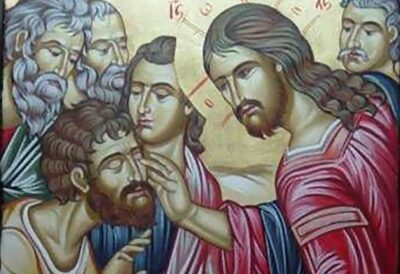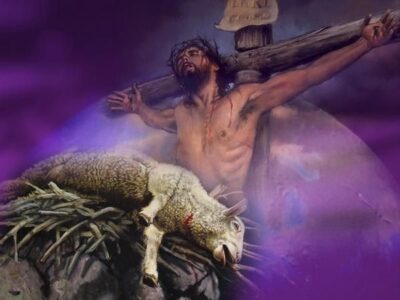September 17, 2023
|by N W
|
0 Comments
|
Family, Father Nixon, Forgiveness, Healing, Humility, Love, Obedience, Reconciliation
Twenty-fourth Sunday in Ordinary Time
September 17, 2023 — Year A
Readings: Sir 27:30-28:7 / Ps 103 / Rom 14:7-9 / Mt 18:21-35
by Rev. Nixon Negparanon, Pastor
A 99-year-old woman, pushing on in years, boasted to her pastor that she didn’t have an enemy in the world. He was very impressed. What a wonderful thing to be able to say after all those years! And then she added, “I have outlived them all!” If we live long enough, we’ll also be able to make the same statement.
“What goes around comes around” is a common expression. Its familiarity springs from the truth. When we offer words of kindness and love to others, that invites words of kindness and love in return. On the other hand, isn’t it true that words of anger only produce more anger on each side? The harsh judgement we pass on others easily could apply to us as well. In the final analysis, we will be judged by how we treat others, not how they may have treated us.
So what is it that we want to go around and come around? The reply that we offer should not be merely words, but also deeds. The wise man Sirach in our first reading says, “Forgive your neighbor’s injustice; then when you pray, your own sins will be forgiven.” These words in many ways echo the Lord’s Prayer: “Forgive us our debts as we forgive our debtors.” We have indicated that we want the same treatment as we give others.
The problem is, if we treat others in an unkind manner, we are asking that God treat us the same way. For example; if the young people here do not cooperate with their elders by loving them and obeying them, it means that they are saying to God: My parents shouldn’t love me and shouldn’t respond to my wishes. Jesus is saying that if we treat others poorly, then it’s only natural that they will treat us the same way. You are in command. Treat others well, including parents, and they will treat you well.
There is a story of a six-year-old, John. During night prayer he paused before his brother’s name and said to his mother, “I will not ask God to bless Paul. He gave me a big blow on the nose today.” The mother said to John, “But Jesus asked you to forgive your enemies.” Little John responded, “That’s the main problem. Paul is not my enemy, and that’s the reason I cannot forgive him.”
The reaction of little John tells us that forgiveness is hard, and that forgiving family and friends is even tougher. Forgiveness and reconciliation are twin virtues that hold a relationship whether it is an interpersonal or interethnic or interreligious relationship.
One of the hardest things to do is to forgive those who are mean to us. To forgive those who have done or said terrible things against us, or even to forgive those who contribute, or those who continue to put us down and those who hate us with disdain.
Have you ever found yourself in a situation where it was difficult to forgive someone who offended you? Yes, forgiveness can be very hard in certain situations, and for this reason it takes such a long time before we train ourselves to forgive our offenders, especially when they are people we trusted so much.
The first step towards forgiveness is the ability to say, Yes, I forgive. It really takes a lot of courage to forgive. The second step is to ask for the help of God by admitting, God, I really want to forgive, but I do not know how to forgive. Help me to forgive totally and completely from the depth of my heart.
Too often we wait for others to make the first move. We hesitate because we might face rejection, or we don’t want to seem too weak or eager for reconciliation. That’s not how Jesus treated us. He made the first move. He loves us so much that He died for us. We can show the same love by having His courage to treat our family and our friends in the same loving manner, not waiting for them to display their love but to offer our love first. Each of us must be Christ-like: We must take the initiative.
Our Lord gives this gospel as a warning that we must be constantly on our guard. God has forgiven us for things we could not possibly hope to repay. And we are duty bound in gratitude and compassion to share the graciousness, forgiveness, and charity that God gives to us and others around us.
In the gospel, Peter is asking about the limits of forgiveness. Isn’t it true that if we just grant forgiveness to someone who’s treated us in an unloving manner that they will continue to take advantage of us? Jesus says, “No, don’t forgive friends or members of your family seven times, but seven times seventy times.” Unlimited.
Jesus willingly gave His life for us because He loves us. We show our love in the same manner and, if we do, that love will be returned, whether it be from our child, our parents, our friend, or even from someone we don’t like. We do it not because we are weak, but because Jesus has asked us to do it, and He has promised we will be blessed for our actions.
Also, we must learn to forgive ourselves. Imagine you’re responsible for something very serious; you are driving a car while under the influence of alcohol, there is an accident and a young person is killed. That life cannot be brought back. For more and more people, there is something in their background, some skeleton in the closet, as we say. A broken marriage, an abortion, a pregnancy outside marriage, a broken relationship, or a serious mistake. And for many of us we do not believe that there is another chance, much less seven times seventy chances.
This is not the teaching of Jesus. God doesn’t just give us another chance, but every time we close a door, He opens another one for us. The Lord challenges us not to make serious, damaging mistakes. But He also tells us that our mistakes are not forever. They are not even for a lifetime, and time and grace wash us clean. Nothing is irrevocable.
The words of Sirach in the first reading say it all. “Think of the commandments. Hate not your families and friends, remember the Most High’s covenant, and overlook faults.” And so, as each of us takes a few minutes coming to Communion, think of what we can do for our families, our children, our siblings, and all of our friends so that we will love one another as Jesus has loved us. Let us continue to promote that awareness that we are all in communion with one another and with the one God. What we do to others we are taken as doing to God himself. May Jesus Christ be praised.
KEEP READING
 540-586-8988
540-586-8988 





